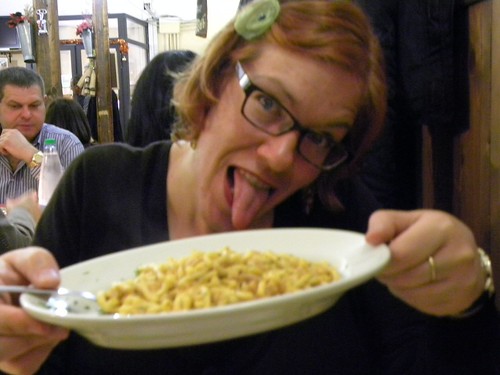I wrote not long ago about generating a big pile of ideas for a future book or story, of using the brainstorming process to explore all the things you might want to write, the better to figure out which idea would be the best use of your time and energy.
But once you have that big shiny pile of potential storytelling treasure, how do you separate the iron pyrite from the nuggets of gold?
Sometimes you’re lucky. There’s an obvious contender. It grabs you, it beguiles or terrifies or otherwise drags you to the notebook or keyboard. You are compelled to write it. That’s an incredible feeling, and can lead to some amazing fiction. But what if there are a few tantalizing prospects? How do you decide which ones are keepers?
I believe a skilled writer can take almost anything and turn it into a decent story. All those quickly jotted concepts have some potential; like seeds, they’re just waiting for the right conditions so they can germinate. I mentioned Macbeth in Spaaaace! in that previous post. It sounds a little silly, right? It’s meant to. I scrawled it down quickly and initially dismissed it out of hand. But as a starter for a book goes, there’s nothing actually wrong with it. Tend it just a bit, and you might get something like: “a tale of ambition and murder, set on a 29th-century space station haunted by ghost-like aliens who adopt the appearances and personalities of the recently dead.”
I could run with that. And I bet every single one of you could spin up your own interesting take on that same questionable catchphrase. Shakespeare’s core idea is all about ambition out of control, after all–the desire for power. That’s never going to lose its currency.
So, if you do have a bunch of rapidly generated concepts for stories, and they all have the potential to be amazing, does that mean all ideas are created equal?
No. Some ideas can simply carry more than others. I can think of no better way to put it than to go back to the metaphor of story seeds. Think of them this way: some are flowers and some are trees.
(Don’t get me wrong: I loooove flowers. I’ve published over thirty short stories and I’ve got more on the way.)
It’s pretty common for writers, especially new writers, to start on something they think is a story, only to have it climb sky-high on them. In almost any medium-sized story workshop–imagine ten or so writers, each submitting a completed work of short fiction–it’s common for at least one draft to come in that is super-dense, bursting with a complexity that challenges its length. These pieces have too many characters and too much going on. They have subplots begging to be written, or actually crammed within the margins of the action. Just establishing the setting and principal characters takes pages, everything’s incredibly interesting, you hit the 6000 or so word mark. . . and then Boom! The writer wraps it up suddenly, superfast.
“I think this may be a novel,” is what you hear, invariably, when these pieces are workshopped. Readers can see that the idea is just, somehow, a book. It can carry more.
Is there a way to tell which is which before you start writing? Perhaps not always. Experience helps. With practice, you develop a better sense of your own rhythms and proclivities, and you can take a look through the list and see which ideas are going to snap together beautifully, in a few scenes. Those are the flowers.
Here are some clues to help you evaluate the rest.
Do a census: Can you tell this story with two people, or does it need at least ten?
How many scenes can you imagine? Your main character’s gonna start out in one place, emotionally, and end up in another. How many beats will it take him or her to get there?
Could you do it in one scene? Is there a way to just write the climax and have it make some kind of sense?
How complicated is the thing the main characters want? Could they get it immediately if they just pulled themselves together, or are there obvious preliminary steps along the way, like walking to Rivendell or finishing grad school?
Does one big thing happen to the main character? Or can you see emotional arcs for any of the others? Is there more than one person going on a big journey?
What are the demands of the point of view? It’s not an absolute rule, by any means, but in short stories we often recommend restricting ourselves to one point of view. If you can’t imagine this story coming together without switching in and out of several of your characters’ heads, you may have a novel on your hands.
Can you imagine the story playing out in one physical locale? No? You need at least two principal settings? They’re going to visit at least four planets? Every member of the main character’s dinner club has to host a night out for the story to work? They’ll eventually quiz fifteen different murder suspects? The higher the number, the more likely we’re getting into book territory here.
Do you have a sense of its tone changing? Is it a quick, nasty, jolt, like Pat Cadigan’s “Roadside Rescue“? A hilarious comic sketch like Ray Vukcevich’s “A Holiday Junket?” Does one of the storylines look like it might be serving as comic relief? Are there places where you’re thinking: ‘here we need to slow the pace a little, or bring the mood down?’ If it’s big enough to need that kind of variety, it is, again, probably a book.
Sketch out a rough outline. Is it half as long as you expected? Four times bigger?
Do you find yourself thinking you can condense three scenes into one, or get rid of characters, to fit a 7,499 word limit? (7,500 is where a story becomes a novelette.) Does that idea, of cutting, fill you with joy or dread?
Most importantly: what do you want to say? What’s cool about the idea? If merely answering this question takes you pages, you’ve probably got a decent weight of material on your hands.
As you work through the above questions, one of your contenders should pull ahead of the pack. And if after all that evaluating you’re still excited about that little seed, still having new epiphanies and discovering things to explore, and “OOh! And also I can do this!” Then you’ve probably got a hell of an unwritten novel on your hands.





